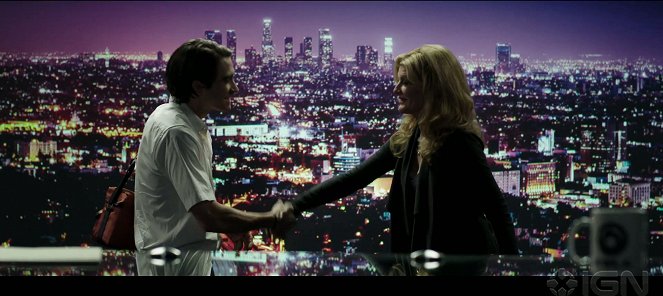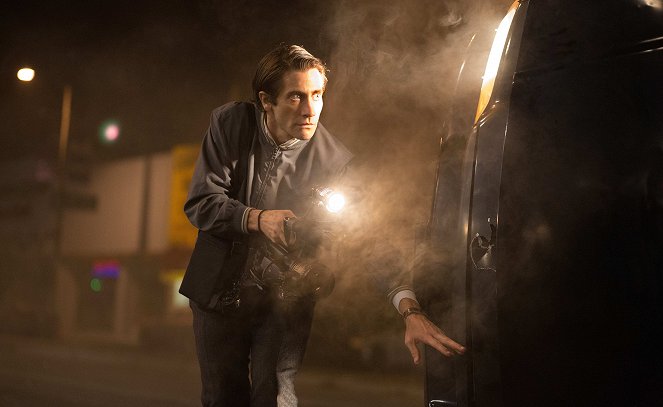Director:
Dan GilroyGuión:
Dan GilroyCámara:
Robert ElswitMúsica:
James Newton HowardReparto:
Jake Gyllenhaal, Rene Russo, Riz Ahmed, Bill Paxton, Kevin Rahm, Michael Hyatt, Ann Cusack, Michael Papajohn, Marco Rodríguez, James Huang, Leah Fredkin (más)Sinopsis(1)
Nightcrawler gira en Lou Bloom, un chico que busca desesperadamente un trabajo. Pero un día descubre el inquietante mundo del periodismo criminal bajo el mundo nocturno de los Ángeles, donde los periodistas freelance graban accidentes, incendios y asesinatos, convirtiéndose así las víctimas y cada sirena de ambulancia o policía en bastante cantidad de dinero. (Filmax)
(más)Videos (7)
Reseñas (14)
Me recordó a Crash, pero mientras en ésa Cronenberg se desata, aquí seguimos a una hiena humana, un ser repugnante del que no sabemos demasiado. Aunque el papel principal está bien interpretado, el personaje de Jakob me resultó extremadamente antipático y toda la película me pareció morbosa. Al final, la tensión aumentó y el final solo acentuó mi desagradable sensación con toda la película. Brrrrrr.
()
Los Ángeles de noche con las ambulancias iluminadas, una carrera jugada duro, la crueldad sensacionalista y el atractivo Dodge Challenger. Comienzo más lento, el final más fuerte. La esencia de la película es el excelente actor Jake Gyllenhaal, que madura como el vino.
()
Nightcrawler is the best date movie for tabloid journalists. At the same time, it is a film that uses the withering television news industry only as a basis for addressing more universal themes with bitter cynicism – the ideology of self-improvement, extreme individualism and careerism in the conditions of market capitalism (which requires giving meaningful-sounding titles not only to meaningless jobs, but even to murder, for example). It also works superbly as a mirror held up to a rotten society, thanks to the fact that Gyllenhaal’s nocturnal predator, with his “Zelig-esque” ability to blend into any environment, lacks a stable identity (it’s no coincidence that one of the film’s final shots quotes the climax of The Usual Suspects). He cold-bloodedly and remorselessly imitates others from the beginning (he is clearly unaware that such things as morals even exist). He didn’t come up with a quick way to achieve great success himself, but learned it by watching and listening (from, among other things, television and online courses). He understood that what sells best is continuously stoked-up fear and that every person and every unfortunate event can be a monetizable commodity. He simply takes what he wants, even if he has to kill for it or create the desired reality himself. I consider the brilliantly escalated development of Lou’s alteration of reality in front of the camera to be the strength of this return to the aesthetic (from which Michael Mann similarly draws) and narrative straightforwardness of the 1980s. From rearranging the photographs on the refrigerator and concealing certain facts, Lou’s path smoothly progresses to repositioning corpses and telling lies that can be lethal. For Lou, the whole of Los Angeles becomes a computer game (GPS map, completing missions within a time limit) in which anything can be done without any major consequences (for the guilty). Related to this is another timeless level of the story – the loss of one’s ability to distinguish between what is real and what is merely conveyed to us in a world lived through media (for example, Lou’s comment that the background in the television studio looks so real, his attempt to communicate with a reporter on the screen). The film itself plays with this boundary between fiction and reality when it takes on the “action” method of news photography, even in shots that are not filmed with a television camera, thus essentially letting the protagonist become the director of what we see. Apart from his inability to distinguish between what is real and what only seems to be real, however, Lou is not that different from people who live only for their careers. Because of that, Nightcrawler could continue to elicit unpleasant chills long after the television news industry has been supplanted by internet journalism. Or something even worse. 80%
()
The emotions are about as warm as a winter morning. The characters without a personal story may evoke viewer antipathy, but the economical handling of characters who have sold out to ratings numbers works a treat because these stalkers remain something detached for most of us, coming to us through spicy TV shots, even in ordinary reality. Also, Gyllenhaal's sleazy character works so well that you don't really care which way you're supposed to view the protagonist, which emerges in the end as the main trump card of the creative narrative, and you sort of even accept the pre-credits finish at its mercy. 4 ½.
()
Nightcrawler was exactly what I was expecting it to be, which is basically the only complaint I can have. It was missing at least one moment of bigger surprise or shock. Basically, I thought that Gyllenhaal’s self-confident sociopath (all the good things that’ve been said about his performance are true) would go a little further in his quest for career advancement. It’s a critique of an awful era and the lack of morals, where only viewership numbers have value and ethics are pushed aside. “I will never want from you anything that I wouldn’t do myself.” Impressive, dark, captivating, but I think Lumet’s Network cuts deeper. 9/10
()



Anuncio